
We need to expand our team of proofreaders as we aim to increase the rate of republication of Satsvarūpa Mahārāja’s books as well as new books that he writes.
This includes a need for fluent bilingual Spanish and English speakers to proofread Spanish translations (we currently have around 20 Spanish translations waiting to be proofread).
Anyone interested in this particular service should contact Manohara dāsa at [email protected]
If you would like to help, please contact Kṛṣṇa-bhajana dāsa at [email protected] or [email protected] and we will find you a service that utilizes your talents.
Srila Prabhupada gave us japa as the most important instruction. Sixteen rounds. Why do more? Because we tend to neglect it. For offensive chanting, it’s recommended that you chant more. Nirantara—without stopping. Kirtaniya sada-harih. Satatam kirtayanto mam. I’ll be doing that today. Chanting eight and a half hours if Krsna allows me. Please, Lord, let me chant; please engage me in Your service.
******
It’s not extravagant to chant extra for a week. Rather, it is required to improve, to fix. It’s remedial work. I have neglected my japa, made it always subordinate to other services, chanted with inattention, to get it out of the way. The sixty-four rounds quota will help me show my sincere desire to the Lord in His form of the name.
******
You can drink the bitter chalice of death, and before that today this chalice of sweet-water japa to prepare yourself for death, to remind yourself you go to Him and He comes to you in His names.
******
And what do you get out of it? Did you reach the devotion? Did you pray to your Lord? Did you allow your cynic full force? Chant, chant, chant, chant, chant, chant mechanical? I did it, I did it, like a little gurukula boy. I feel the urge to run up to each adult and say, “I did it, I did it, I chanted my quota.” Is that what it’s all about?
******
Dear Lord, I’m just a blank, but You see me chanting and so there’s some good in it, I know, and I feel it too, but it’s way subterranean from where we have no taste, and that’s because I cause offenses. That’s what Lord Caitanya says.
******
In less than an hour we meet for our little group session of sharing a day. What will I be able to tell them? I’ve got a tape cued of Prabhupada talking about Hare Krsna mantra. For myself I don’t want to be so casual and just say, “Oh, I just grinded away sixty-four rounds today, and I didn’t feel anything, I didn’t feel anything, but I chanted quicker than yesterday.” Really, can’t you say something? Will it be exposing that you’re just a complete blank? Or you can read scripture, but where’s your heart? I don’t know, I don’t know. There’s nothing to say, really. I don’t want to say anything. There’s nothing to say to them except that I’m here, I’m chanting, and I don’t feel so great but I don’t know what else to do. And if I stop chanting, I wouldn’t feel so enthusiastic about anything else either. I’m trying to stay in this one day, try not to worry, blanking out on other things, but then there’s just the mechanical act. I have nothing to say, I’m sorry. Just, “Chant Hare Krsna, Prabhus.”
******
Remember that haiku?
Reposing on a desk
they invite me once again
my red japa beads.
That got published and a famous American haiku-ist called it “inviting.” Nowadays, they (beads) are hardly out of my hands. They are being used, worked, shiny old reds. I use a glove so I don’t get a bleed, sore skin.
******
You a fireman?
You a Harvard student?
No, I is a chanter in
a Scottish stop, in
a “mark cottage” with friends
doing the best we can.
pp. 1-4
Between preaching and behavior there exists a dynamic tension. This is expressed in Sanatana Gosvami’s praise of Haridasa Thakura:
Some behave well but do not preach the cult of Krsna consciousness, whereas others preach but do not behave properly. You simultaneously perform both duties in relation to the holy name by your personal behavior and your preaching. Therefore you are the spiritual master of the entire world for you are the most advanced devotee in the world. (Cc. Antya 4.102-3)
Srila Prabhupada confirms that his own followers also must preach and behave in an exemplary way:
….. The qualifications expressed in this connection are that one must act according to the scriptural injunctions and at the same time preach…The members of the Krsna consciousness movement chant a minimum sixteen rounds a day, which can be done without difficulty, and at the same time they must preach the cult of Caitanya Mahaprabhu according to the gospel of Bhagavad-gita As It Is. One who does so is quite fit to become a spiritual master for the entire world.
Bhaktisiddhanta Sarasvati Thakura has derided solitary chanting as a kind of cheating performed to attain name and fame. Similarly, if one simply engages in temple worship but doesn’t see to the welfare of the masses, he is on the lowest rung of devotional service. A devotee should not retire to the forest in search of the ideal place for executing Vaisnava behavior. Rather, he should stay in the cities and offer people the chance to go back to Godhead. The Srimad-Bhagavatam states that if a brahmana neglects those who are in want of Krsna consciousness, that brahmana’s spiritual knowledge will diminish, “just as water kept in a cracked pot leaks out. (Bhag. 4.14.41, ppt.)Lord Caitanya also expected His direct followers to do their daily share of preaching, indicating that preaching is not optional—it is a must. The devotees of Lord Caitanya must preach Krsna consciousness in every village and town in the world. That will satisfy the Lord. It is not that one should act whimsically for his own personal satisfaction. This order comes down through the parampara system, and the spiritual master presents these orders to the disciple so that he can spread the message of Sri Caitanya Mahaprabhu. It is the duty of every disciple to carry out the order of the bona fide spiritual master and spread Lord Caitanya’s message all over the world.
—Cc. Madhya 16.64, purport
Therefore, whenever we stress good behavior for the Vaisnava, it should be understood that the Vaisnava is a preacher. “Every devotee should be very enthusiastic,” writes Prabhupada, “not only in performing his daily rituals of devotional service, but in trying to preach the cult peacefully by following in the footsteps of Lord Caitanya. If he is not superficially successful in such an attempt, he should not be deterred from the discharge of his duty.” (Bhag. 2.8.21, purport)
If a devotee tries to avoid preaching, he cannot become spiritually advance. Indeed, Srila Bhaktivinoda Thakura has said that the position of a Vaisnava can be tested by seeing how good a touchstone he is—that is, by seeing how many Vaisnavas he has made during his life.
Nevertheless, we should not consider the rules and regulations of Vaisnava behavior to be some mere ritual or formality. “The first preaching work,” Srila Pra-bhupada wrote in a letter, “is that you yourself should become an ideal devotee.” (April 23, 1974 to Niranjana dasa) This is also express by Lord Caitanya: āpani ācari’ bhakti śikhāimu sabāre: “First become perfect, and then preach.” (Cc. Adi 3.20) The physician has to heal himself before he goes forward to help others.
Go on preaching with vigorous enthusiasm, and increase your program for bringing new men to live in Krsna consciousness.
You yourself must be ideal in following the rules and regulations, rising early, and restricting eating and sleeping. The less a person is concerned with material enjoyment such as eating, sex, and sleeping, the more he is spiritually advanced. If the “devotee” himself lives like a hog or dog, how can he preach?—Letter, January 26, 1977 to Danavir dasa
Only an immature preacher thinks that he can maintain enthusiasm for his outgoing service while at the same time not pay strict attention to the rules and regulations. In an Eleventh Canto purport, Hridayananda Maharaja writes:
One who has achieved the shelter of the Lord’s holy name and is totally engaged in the attempt to serve the Lord should be considered to be on the platform of bhajana, even though his external activities may sometimes be less strict than those of the neophyte engaged in arcana. The apparent lack of strictness, however, refers to laxity, not on the basic principles of sane behavior and renunciation of sense gratification, but rather in the detail of Vaisnava ceremonies. (Bhag. 11.2.46)
Maya is undoubtedly very strong, and preachers have to be vigilant like soldiers in a fortress. By keeping all activities Krsna conscious, a preacher will not allow maya to enter. Srila Bhaktisiddhanta Sarasvati used to say that a preacher has to have life; he cannot be a dead man. Vital spiritual life depends on strict Vaisnava behavior. “Preaching work is strong,” wrote Prabhupada to a temple leader in 1972, “if our routine work is strong. Never neglect our regular program, and that will be your success.”
pp. 197-201
My dear Lord Krsna…
I pray that You will allow me to waken my relationship with You and realize You in truth. This is a big request. I feel my relationship with You is to a large degree theoretical. I would like to be realized. After hearing the descriptions of You, I accept them. I do not disagree with them, but I don’t know them as truths and experiences to my heart. I am not at the stage of actual God realization.
Let me give examples. I hear how the residents of Vaikuntha worship You and how the residents of Goloka Vrndavana know You. They are different, but they are both real. The Vaikunthavasis worship You in awe and reverence. They see You as the all-great, Supreme Personality of Godhead. When You come to one of their planets, they worship You with prayers of great eloquence, extolling Your supreme power, Your love, and Your majesty. They offer these prayers from their hearts, and they are completely surrendered to You. If they did not feel this way wholeheartedly, they would not be eligible to worship You in Vaikuntha. They are completely pure, God conscious souls.
As exalted as the residents of Vaikuntha are, the Vrajavasis are even more exalted and have an even more intimate union with You. The residents of Vrndavana are higher because their love of You is not dependent on their recognition of You as the Supreme Godhead. They worship You in personal relationships as master, friend, child, or conjugal lover. You appreciate these exchanges more than You appreciate the more formal worship of You as the Godhead in Vaikuntha. You enjoy being sometimes treated as subordinate by Your devotees in Vrndavana, something the devotees in Vaikuntha would never do.
But in either the case of the Vaikunthavasis or the Vrajavasis, the devotees love You truly as the dearmost object in their life. They have no other interest or distraction in their lives. They have no tinge of materialism or philosophical impersonalism. They relate to You just for Your pleasure, not wanting anything in return for themselves.
I find this standard lacking in me. I am not absorbed in You as the outstanding reality in my life. I do not constantly sing Your praises. I am not without anxieties for my own well-being. I engage in sense gratification—seeking comforts for my body. I fear my death. I do not always behold You and Your eternal Consort (Radharani or Laksmidevi) with delight, either directly before my eyes or in meditation in Your physical absence.
I do not deserve to live in the spiritual sky. There are pure devotees living in the material world who have reached the stage of perfection and are just waiting to be transferred to Your abode. They are performing service for You in this world, but they are completely absorbed in Your name, form, qualities, and pastimes. I am not one of them. But I desire to advance to that stage. I am not yet at a standard that qualifies me for that stage of devotional service. Please help me to advance. I don’t want to remain a neophyte devotee who commits offenses in chanting and who is not completely engaged in the sankirtana movement of Lord Caitanya and who does not love all the Lord’s devotees and who doesn’t work to save the nondevotees. I am ashamed to be at a lower status after four decades of devotional practice.
I do not even cry tears to be engaged better in a particular service, which Prabhupada writes is a sign of perfection. I am complacent. I am not satisfied with my position. Please know that I wish to do better, and if You desire, offer me assistance to advance. Left to my own powers, I don’t see the chance of my reaching the stage of perfection. Your mercy and the mercy of my spiritual master is all that I am made of. I will try my best to maintain my practices and to improve, but I beg for Your boost. I want to realize You more and use my energies to please You.
Rati-manjari says ever
since Rupa-manjari has filled
her eyes with light in the
land of Vraja, she has yearned
to see the red lac decorating
Radharani’s feet.
When she saw Radha-kunda
filled with sweet water and splendid
with many blossoming flowers,
she at once began to yearn for
the nectar of direct service
to Radharani.
Rati-manjari prays, “O Queen,
I shall never ask You for anything
other than direct service to Your
lotus feet . . . May I find Your
service as sweet as nectar.”
She wants to daily rinse the drains
of Radha’s house with pure water
and dry them with her own hair
and then scent Her garden pavilion
with sweetly fragrant incense.
She wants to render all
personal bodily service of
Radha’s bathing and drying
and dressing, while her
own hairs stand up in bliss.
I read these things and
then wonder at their
beauty and desirability.
They are beyond me, but I
do not stop from hearing
them.
Service to Radha is light
years away from me, yet
Raghunatha dasa Gosvami shares
it with his readers. And we can serve
Sri Radha by chanting Her
names in the Hare Krsna
mantra and serving Her
Deity form.
I am down here on earth
with my pains and
melodies. I yearn to
be a better devotee and yet
to be who I am. I
don’t mean I wish to be
a fallen fellow but to
be non-imitative, accepting
my tendency to hear blue
music as a part of my
self that doesn’t have to
be banished.
I like reading the new
poems of Radha and
writing out of my heart
from a picture of Prabhupada,
sharing with readers feelings
of devotion to him who
allows us to enter
the sacred precincts.
Unless Prabhupada permits
us, we cannot hear of Radha
and Rati-manjari, but he
had said it is all right.
He has guided us in the
diet of preaching and chanting
and service, so we will
not become prakrta-sahajiyas.
He kindly accepts my service.
I am not an associate under
the direct care of Svarupa Damodara,
but I am under the care of
Srila Prabhupada and that
is just as good.
Today I published a picture of
Prabhupada in Boston in
1971. I was there with
him, and I carry that
with me even today. Whatever
association I had was nectar,
and I continue it now
in separation. May I
find your service as
sweet as nectar. May
I find your service as
sweet as nectar.
pp. 187-91
Los Angeles
16 March, 1970Boston
My Dear Satsvarupa,
Please accept my blessings. I beg to acknowledge receipt of the edited copy of tape #19. I shall reply the points listed by Pradyumna in a separate letter.
I have received information from the Scindia Steam Navigation Co., Ltd. that the pair of Deities, 24 inches high, weighing about 50 kilograms the pair, will be arriving in Boston sometimes by the end of May 1970. They will be delivered by the New York Agents of the company. The Deities will be carried by the vessel “Jalapalaka.” So you may note this, and you have to prepare a bigger throne for accommodating the larger Deities.
When the large Deities are installed, the small Deities should be worshiped as Vijaya Vigraha which means this pair of Deities may go outside the Temple in a small car as they have made in L.A. This car was made by Nara Narayana, so he can give the idea. This Vijaya Vigraha may be taken out with Sankirtana Party, not always, but conveniently. In due course of time, I shall let you know the details. Your Temple will save about $400, including price and freight of the Deities from Vrindaban, India. This money may be contributed to my book fund.
Hope this will meet you in good health.
Your ever well-wisher,
A.C. Bhaktivedanta SwamiP.S. I am enclosing a note for Pradyumna herewith, please find, and also a poem to be published in BTG. Your tapes have daily been received.
If anyone has been to the Boston temple, they will know how small our first Radha-Krsna Deities were. It was very hard to see Their features from the temple room, and it’s likely that many devotees had the idea that we should get larger Deities. We were fortunate in that, delete comma when we asked Prabhupada if we could get larger Deities, he undertook to arrange for Them himself. Their size and whether They should be brass or marble was decided by Prabhupada. Receiving twenty-four inch Deities was a blessing; our original Radha-Krsna were only eight inches tall, so there would be quite a difference in our ability to relate with these new Deities. There were devotees in India at the time we made our request, so Prabhupada asked them to have three sets of Deities made. These Deities are identical and are now installed as Radha-Gopivallabha in Boston, Radha-Gokulananda in Berkeley, and small Radha-Madhava in Mayapur.
When the Deities had been shipped, Prabhupada wrote to give me the shipping information. It was exciting to think of Them coming! We wanted Prabhupada to install Them, but he didn’t actually come until 1971. We can follow the history of this installation in his letters. There are a number of letters where he stated that he was just now coming, but still he didn’t arrive. He told us to make new clothes for the Deities, and the anticipation for the installation gradually built until Prabhupada actually came. This anticipation created a nice spirit among the devotees. When the Deities finally arrived, we kept Them in a closet until Their installation, but we would look at Them regularly, always waiting for Prabhupada to come.
When I got this letter, I sent one of the devotees to follow up the information with Scindia’s New York agents. Nobody at Scindia could know how much the arrival of that crate mattered to the devotees, but this crate represented the life of our temple. Radha-Krsna were arriving!
Prabhupada writes that we have to prepare a bigger throne for the Deities. I can’t remember exactly who built it, but it is likely that it was Nara-Narayana. Nara-Narayana would sometimes be in the temple and sometimes not, but when he was available, he would build Deity thrones. We modeled our throne after the Deity throne in Los Angeles and covered the canopy in magenta velvet. We silver-leafed the wooden pillars, and we may have added pearls for decoration. Nara-Narayana built beautiful Deity thrones. Although Prabhup?da named him Nara-Narayana, he also gave him an affectionate nickname: Visvakarma. Nara-Narayana built the first Ratha-yatra carts, and that feat in itself was considered miraculous. He also constructed papier-mache dolls. Prabhupada said he was a wonderful builder.
Prabhupada also tells us that we can use the small Deities as vijaya-vigraha, festival Deities. Although he said we could take Them outside with us when we went on sankirtana or perhaps for a festival, we rarely did so. We had heard that in Los Angeles they had a simple cart upon which they could place the Deities and pull Them through the streets, starting from the temple door. Although the neighbors did not take part in the “festival,” the devotees would go to good neighborhoods, distribute prasadam, have kirtana, then return to the temple. Prabhupada said we could get the same kind of carriage that they had in Los Angeles. Although we didn’t follow his instruction to take the Deities out, it’s something that’s still open to the present Boston devotees to do: the small Radha-Krsna can go out for festivals or preaching.
pp. 14-17
Was praying just now. I think that’s what it was. Had all good qualities, aspirations to reach realization, cut through in writing, chanting and reading. That’s my desire. The prayer state lacked a push to produce this expression, just more meditating on it. Push is the creator. It was quiet, restful afternoon state, awake after rest, nowhere you had to be,
no duty you had to do,
not even writing a certain book,
and reading I put aside in favor of thinking over and feeling what I’ve already been reading. I guess you call it mental worship and prayer. It’s rare for me. I would like to be able to do it even when traveling in van or ferry . . . Even when I’m feeling physically weak and certainly I’d like to be in touch while actually chanting the holy names and reading.
Writing leaves the record.
Trust in process.
This is a retreat, and you can allow yourself this luxury. The holy name can come down from head and enter the heart. It’s in the Art of Prayer book. If I look at that I can see it, although you’ll get the Christian version. Still to what Krsna sends you, as He did today, a little taste of it.
Components: peace, nonachieving mood, clarity of thought, feeling you have nowhere to go, nothing to do—even if you had such duties you could put them aside for a precious half-hour or more and pray like this, The reality of Krsna conscious state is my desire, and I pray for it.
Don’t be afraid of it. (“Too much surrender.”) Don’t be afraid to ask for it. It enriches all your acts, gives you security. So you do more than just look at your watch and read-chant-write in somewhat uptight and perfunctory way. You came to a retreat for this purpose.
Clang clang clang clang-4 P.M. The town sometimes erupts into loud passersby, radios’ rock music, slam of door, car goes by. But then it becomes quiet again. You are free up here. They call it the “city of science” but I needn’t be affected by that or by the tourists who go to the old, old stone churches or sexy women hiking with men and looking around. Keep behind these doors, keep the heat out . . . I thought of Vrndavana, not being interrupted or pressured in the Krishna-Balaram guest house. But that place of intense Lila devotion which is pursued by many people there. It’s so much better than the West can offer. Yet Mayavadts live there too. Still, you know that just outside are many parikrama places, a tree where Lord Caitanya sat
when He visited Vrndavana. Did He actually sit there? Maybe. At least people want to think like that. And you can sit by the tree or by Govardhana and think those thoughts. Here Krsna accepted the prayers of Lord Indra, here Krsna stopped the gopis with their milk and demanded a tax . . .
And here is the Hare Krsna mantra which my spiritual master gave to me.
What prevents you from always thinking and feeling in a Krsna conscious way? Is it so unattainable?
Why not do it always? Gain it in this retreat and never relinquish it. I cannot do it on my own power. But I can stay in the practices which will yield it. Know that whenever you read or chant—or write—you’re doing the best thing to bring you to the stage of more access and feel of reality. If in a given session you are stuck and detained, still you are attempting it.
Your decision not to eat sweets may have helped. It can give you more clarity. You exert a power, control over your tongue and your mind’s demands. That control can then be directed toward the spiritual practice.
Don’t force, don’t force. You desire to enter the reality of your devotional practices. That is your prayer.
Not even twenty minutes at this. Give us at least a half-hour, then “we” will let you go . . . to wander, to read randomly. You’d like to go in other room and on the typewriter to some “hot” writing, produce a poem? At least I’d like to show that poem series that it’s possible to cut through to more direct Krona consciousness. That means writing down some katha you have previously read. When I say enter reality of Krtma consciousness it means the reality to the Srimad-Bhagavatam passages and the holy name’s siddhanta. Nama bhajana.
I thought, Oh maybe I shall read Caitanya-mangala. But why this resolve to find the auspicious and the nectar in your spiritual master’s books? (At least those people in the street speak a language un¬known to me and unthreatening.) People like to help each other, mostly to enjoy sense gratification. Religion they may admire but don’t practice. It requires some vairagya and I am gaining a new edge of it by giving up sweets. So you claim.
The Lord can give or withhold. You need to regularly fuel up in his books.
Krqua glanced at the women on the rooftops as He and Balarama strode through the streets of splendor¬ous Mathura. He wore clothes that attracted Him, picked out from the dead washerman’s collection.
Krsna, Krsna, Krsna.
The wise-guy smart-aleck poets. Don’t be one of them. Beg for mercy of holy name.
pp. 37-40
Bhaktivinoda Thakura’s Dainya songs are intense. The word dainya means “wretched, miserable, afflicted, poverty-stricken, low-spirited, feeble.” He has infused every stanza with that mood in his depiction of an old man who sees all his plans frustrated. Too old to enjoy the senses now, troubled by diseases and anxieties—and it’s obvious that nothing will improve. There’s nothing to look forward to but death. “I would worship You, O Lord, but it is a useless hope.”
I want to empathize with his mood, but I will have to depart from it also. It’s not my normal state. My state is peace-seeking, counting blessings, looking for deeper entrance into Krsna consciousness, an awareness that I’m not advanced and not pure. I’m thankful for what I have. I haven’t awakened to deep remorse over what I lack.
I don’t feel complacent or ingenuous as we sit in our Renault van atop a mountain, near a sanctuary built into the rock. I am a little worried thieves and murderers could come during the night, but I also entrust my life to Krsna and try to overlook that possibility.
Tomorrow we will go down to this town and begin a five-day Ayurvedic treatment. After that, I’ll be free to write in peace. This is where I’m at externally. Internally, the quality I am seeking may take many, many births. It’s not cheap. But this is all I have for now. Anyway, let me write even now. I am not writing because I feel forced, but because I want to. Prabhupada said of his own writing,
Why I get up at night, one o’clock, and do this job? Because I cannot do without it. How will one do it artificially? This is quality. Therefore they like my purports (Conversations With Srila Prabhupada, November 2, 1975).
I wish I could read these songs in Bengali. He writes so personally, as I also try to do. He has not filled these songs with sastric quotes, but he is writing for us. It is painful. His songs are disturbed laments. They make us uneasy. Maybe that’s why we tend to become preoccupied with asking whether he is really talking about himself in these songs. It diverts our attention rather than focusing it where it belongs, on ourselves. That would be too hard to take.
Yesterday at lunch, the topic of Yugoslavia came up briefly. Our host said different people have been placed together, Serbs and Croatians, by falsely designated political borders. Now they are cruelly destroying each other. I thought, “You don’t have to repeat the details. Stop there. Don’t say ‘rape’ and ‘roasting’ and ‘butchering bodies.’ Don’t disturb our lunch.” I thought of asking, “Yugoslavia is not so far from Italy, is it? It’s just across the Adriatic Sea.” I imagined the Italian planes guarding their coast.
Don’t disturb us. Don’t bring up negative topics. Leave us to continue hoping bad things won’t happen to us. We are going for a five-day health treatment—we are trying to stay alive.
“The current of this worldly river is strong and relentless. A frightening, gloomy death approaches. How I wish I could give up my worldly attachments. I would worship You, O Lord . . . “
Let us take shelter while we can in the patch of peace we live in, with whatever health we possess. We all have to leave here eventually—yes, that means everyone who gathered with me as we worshiped Tulasi-devi and everyone in this Italian town. Whether or not someone comes up this hill to disturb us, we will all have to die. The blonde woman who drove up in the small gray car and spent half an hour in the sanctuario, the old man who came up on his motorscooter and left at once, the dog barking at 2:30 A.M., and my dear Madhu (unthinkable), and me, precious me, the writer . . . We all have to die. But Bhaktivinode Thakura lives on in this stanza. “Without Your mercy, everything is lost. Please give me the shelter of Your lotus feet.”
Padasraya: I take shelter at Your feet. Feel and believe and enter. This is the time and place for prayer. I need to hear you, Bhaktivinode Thakura. We all do. “Now please hear me, O Lord, for I am utterly helpless.”
pp. 143-47
I am trying to chant silently in this house, but there is lots of noise from a workman. I retire to a quiet bedroom and continue my mantras. It is ideal to chant in a quiet place and chant without disturbance to the mind.
I am not an offenseless chanter, but I try my best. Lord Caitanya will award me mercy if I go on striving without admitting defeat.
A nurse is coming at 8:00 P.M. tonight to give me an inoculation against migraines. I will wake up and take it as I’ve taken them before. They never seem to work, but I will not give up chanting Hare Krsna.
He read a description of Radharani’s hand in a devotee’s book; he said it was beautiful. Is anything as beautiful as the Hare Krsna mantra?
He heard the live music of Bach and Beethoven. Is anything as beautiful as the sound of Hare Krsna?
Classes in Bhagavad-gita
A. C. Bhaktivedanta Swami
Transcendental sound vibration
The picture of Saturday Midnight, Thelonious Monk’s offspring, is included (before dawn).
They said my pieces are becoming “jack-in-the-box” cliches. But it is not true; they are bhavausadhi medicines for all troubles and diseases. Hare Krsna is bhavausadhi—the panacea for all ills.
Pieces are mostly short; they can be a little longer, but we like them to somehow to hit the target of Krsna consciousness. They can be small and lively: Haribol!
Very old men and women who are also disabled, can’t chant and dance in kirtana anymore, not much. But their eyes sparkle, and they are full of joy calling out from within, “Haribol!” Their hearts are lively and full of love of Gaura-Nitai.
I remember that night we recorded a record. When they played it back, everyone was singing and dancing, even the engineers in the studio. There was like a growing point for the whole movement, and Prabhup?da’s first triumph in New York City, and the way he spread his movement throughout the world. I am just a spark, or at most ashes, of those days. But they still are among my favorites. So nice that you are listening to his lectures from 1966. Yes, I am “that boy” who brought him fruit “out of love.”
I am glad you received the book Worshiping with the Pen. You mentioned, “and it reads easy.” That is a virtue of it, but it may also refer to its not being so deep. I’m happy to hear that a truly deep writer like yourself “keeps reading onward” in a book like this. I have written four more journals, and we’re publishing a fifth. We don’t have much money at GN Press, and our readership is also small. But we’re not stopped by that. We keep publishing, even to our small audience.
I was interested to hear you went to Mayapura. I had originally heard that you were going there with Jayadvaita Swami and others to accompany Ravindra Svarupa, and that you have a good report about his health. I have seen materials of your productions, and I have read your available books on the Srimad-Bhagavatam, and I am a fan of yours.
Old friend,
Satsvarupa dasa Goswami
Haridasa Thakura is the Namacarya; nothing could deviate him from the chanting of Hare Krsna. Lord Caitanya loved him very much.
They can be short or tireless: Haribol!
Sometimes the pieces are long, in which case they occasionally get tedious. The very short ones may not be enough. My editor asks if he can sometimes “merge” them, and I say he can go ahead, but he should leave it in my voice. The target is ultimately Krsna, Krsna consciousness. We must not miss that.
But I also like indirect ones.
(adapted from a long poem by William Blake)
To see Krsna in a grain of sand
And Radha in a wild flower.
Hold Infinity in the palm of your hand
And Eternity in an hour …
(William Shakespeare’s Hamlet, adapted):
“To be or not to be?
That is the question”
that the disciple asked his guru.
“Do you love me or love me not?”
The guru replied, “If you love me
Then I will love you.”
The answer is to be the servant of the servant of Krsna.
pp. 66-70
Nistha means being fixed
in the conclusion of Krsna consciousness.
Anyone can come and say
any damned nonsense,
but a Kona conscious person
won’t be affected.
Nondevotees don’t believe.
They are doomed,
and one who believes them
is also doomed.
But not one in nistha.
Whatever happens,
he doesn’t mind
even death
or if he meets a clever Mayavadi
or a beautiful woman
like the prostitute
who came to see Haridasa Thakura.
He had a higher taste than she;
he was compassionate
and liberated her
by his pure chanting.
She could not make him fall.
All glories to Haridasa Thakura.
He was caned
in twenty-two marketplaces
but remained steady
and undisturbed—
remembering Krsna.
They reach a stage
where no talk or act
will dissuade them
from the lotus feet of Krsna.
No matter what,
they remain faithful to Krsna
and stick with Him
and chant His name.
They are always faithful
to their spiritual master,
even if others
invent some new way:
“Let us surrender to someone else
now that our guru has gone away.”
The nisthas say, “No other love—I
will not be a prostitute!”
As Bhimadeva said,
Love means all your love
on one,
Krsna and guru.
Fixed doesn’t mean stubborn
but always Krsna conscious. If
there is an enemy in debate no
matter what he says
a Vaisnava has a solid reply,
and there is no lure
or power
to take him away
from the lotus feet of Govinda.
Let us pray for that.
“I carry what they lack
and maintain what they have.”
Radha and Krsna
and the spiritual master
are the voices of nistha.
“To those who worship Me
with love,” Krsna says,
“I give the intelligence
by which they can come to Me.”
This is a prayer for nistha:
Even at the cost of the body
or all possessions,
I have to keep fixed
knowing this is the one thing
I cannot lose.
Hold on tight
even in the difficult hour;
let me not abandon you.
We are now describing
the advanced stage
of always being steady.
I who narrate this simple poem
am now in water over my head.
I can only pray
though I waver.
My own consciousness
is flickering.
How can I ever describe nistha
or the stages yet ahead
ruci, the taste,
asakti, attraction,
and then bhava, the emotion or affection for Krsna,
and finally, at the summit,
the crest jewel,
krsna-prema,
pure ecstatic love for Krsna.
Now I falter and stop.
Honesty dictates that I end my poem,
Voices of Surrender.
I am one
with two feet planted in this world,
my eyes cast above,
to the spiritual world. I
write from realization
and voices of my experience,
so how can I go above nistha
or speak of nistha at all?
All I know
is the books
and the great saints’ lives.
And I know the life of my own spiritual master.
Once again, I am brought
to the feet of my spiritual master,
Prabhupada.
Clinging to his lotus feet
is the only way
in my poem or my actions
that I can rise
to the higher stages of the bhakti-marga.
If I follow his order
and bring practical results,
then I can be nistha.
I cannot stay a moment away
from the vows I made
to him
to always chant sixteen rounds
and follow the four rules.
And do as he says;
this is nistha for me.
One time before a room full
of his leading men
he challenged,
“Are you convinced?”
We were all terrified silent.
“Are you convinced?” he repeated,
but no one answered.
“Are you convinced that Krsna is God?
If you are not,” he said,
“Then you cannot help me.
I am convinced,”
he spoke for himself,
“and not that I believe only
but it is a fact.
I am convinced on fact.”
And he went on saying
how Krsna is God
although He appeared before Brahma
looking like a small village boy
with no education
and kept a flute in His belt
and in His other hand
held fruit salad and yoghurt.
He appears to be a cowherd boy
but He is God.
Govinda showed Brahma
all the universes and demigods
and all time and space
coming in and out of the body
of Govinda.
Prabhupada is fixed on that Govinda,
and I pray to be fixed
on the order of that Prabhupada.
This is nistha.
New bhaktas coming
into this world
can also become fixed
on Prabhupada and Govinda.
They can follow
my straight words
and become followers
of Govinda and Prabhupada,
of Lord Caitanya and the maha-mantra.
They can take
the wonderful transcendental life
given us by the past acaryas,
and it will work for them also.
They will feel personally cleansed
and become fixed
in Krsna consciousness.
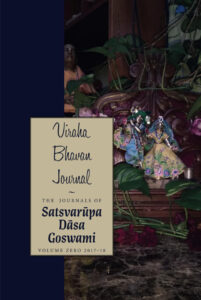
Viraha Bhavan Journal (2017–2018) was written by Satsvarūpa Mahārāja following a brief hiatus in writing activity, and was originally intended to be volume 1 in a series of published journals. However, following its completion and publication, Mahārāja again stopped writing books, subsequently focusing only on what became his current online journal, which began in August of 2018.
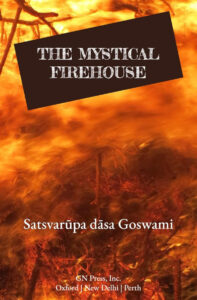
At first, I took it hard that I would have to live surrounded by the firemen, and without my own solitude. After all, for decades I had lived in my own house with my own books and my own friends. I was also now a crippled person who couldn’t walk, living among men who did active duties. But when Baladeva explained it to me, how it was not so bad living continually with other firemen and living in the firehouse with its limited facilities, I came to partially accept it and to accept the other men. I came to accept my new situation. I would live continually in the firehouse and mostly not go outside. I would not lead such a solitary life but associate with the other firemen.
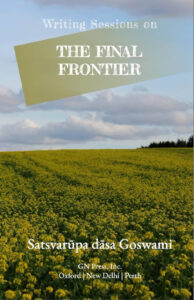
Let me write sweet prose.
Let me write not for my own benefit
but for the pleasure of Their Lordships.
Let me please Kṛṣṇa,
that’s my only wish.
May Kṛṣṇa be pleased with me,
that’s my only hope and desire.
May Kṛṣṇa give me His blessings:
Kṛṣṇa Kṛṣṇa Kṛṣṇa Kṛṣṇa Kṛṣṇa he
Rāma Rāghava Rāma Rāghava
Rāma Rāghava rakṣa mām.
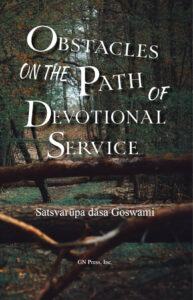
You mentioned that your pathway has become filled with stumbling blocks, but there are no stumbling blocks. I can kick out all those stumbling blocks immediately, provided you accept my guidance. With one stroke of my kick, I can kick out all stumbling blocks. —Letter by Śrīla Prabhupāda, December 9, 1972.
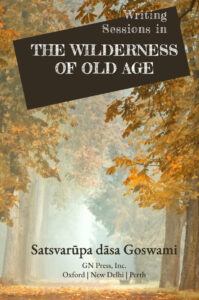
The Writing Sessions are my heart and soul. I’m trying my best to keep up with them. I am working with a few devotees, and they are far ahead of me. I wander in the wilderness of old age. I make my Writing Sessions as best I can. Every day I try to come up with a new subject. Today I am thinking of my parents. But I don’t think of them deeply. They are long gone from my life. Śrīla Prabhupāda wrote a poem when he was a sannyāsī, and he said now all my friends and relatives are gone. They are just a list of names now. I am like that too. I am a sannyāsī with a few friends. I love the books of Śrīla Prabhupāda. I try to keep up with them. I read as much as I can and then listen to his bhajanas.
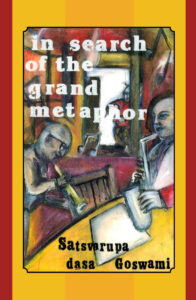
The metaphor is song. Explain it. Yes, particulars may not seem interesting or profound to readers who want structured books.
Wait a minute. Don’t pander to readers or concepts of Art. But Kṛṣṇa conscious criteria are important and must be followed. So, if your little splayed-out life-thoughts are all Kṛṣṇa conscious, then it’s no problem.
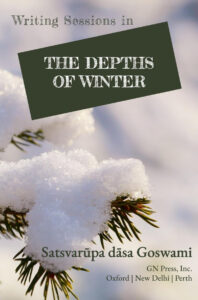
I am near the end of my days. But I do like the company of like-minded souls, especially those who are Kṛṣṇa conscious. Yes! I am prone to Kṛṣṇa consciousness. I have been a disciple of Bhaktivedanta Swami Prabhupāda for maybe almost sixty years. Sometimes I fail him. But I always bounce back and fall at his feet. It is a terrible thing that I sometimes do not have the highest love for him. It is a terrible thing. Actually, however, I never fall away from him. He always comes and catches me and brings me back to his loving arms.

This edition of Satsvarūpa dāsa Goswami’s 1996 timed book, Upstate: Room to Write, is published as part of a legacy project to restore Satsvarūpa Mahārāja’s writings to ‘in print’ status and make them globally available for current and future readers.
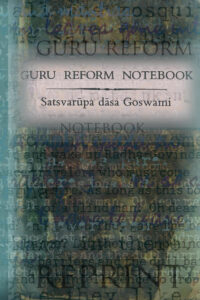
A factual record of the reform and change in ISKCON guru system of mid ’80s.

Readers will find, in the Appendix of this book, scans of a cover letter written by Satsvarūpa Mahārāja to the GN Press typist at the time, along with some of the original handwritten pages of June Bug. Together, these help to illustrate the process used by Mahārāja when writing his books during this period. These were timed books, in the sense that a distinct time period was allotted for the writing, during SDG’s travels as a visiting sannyāsī
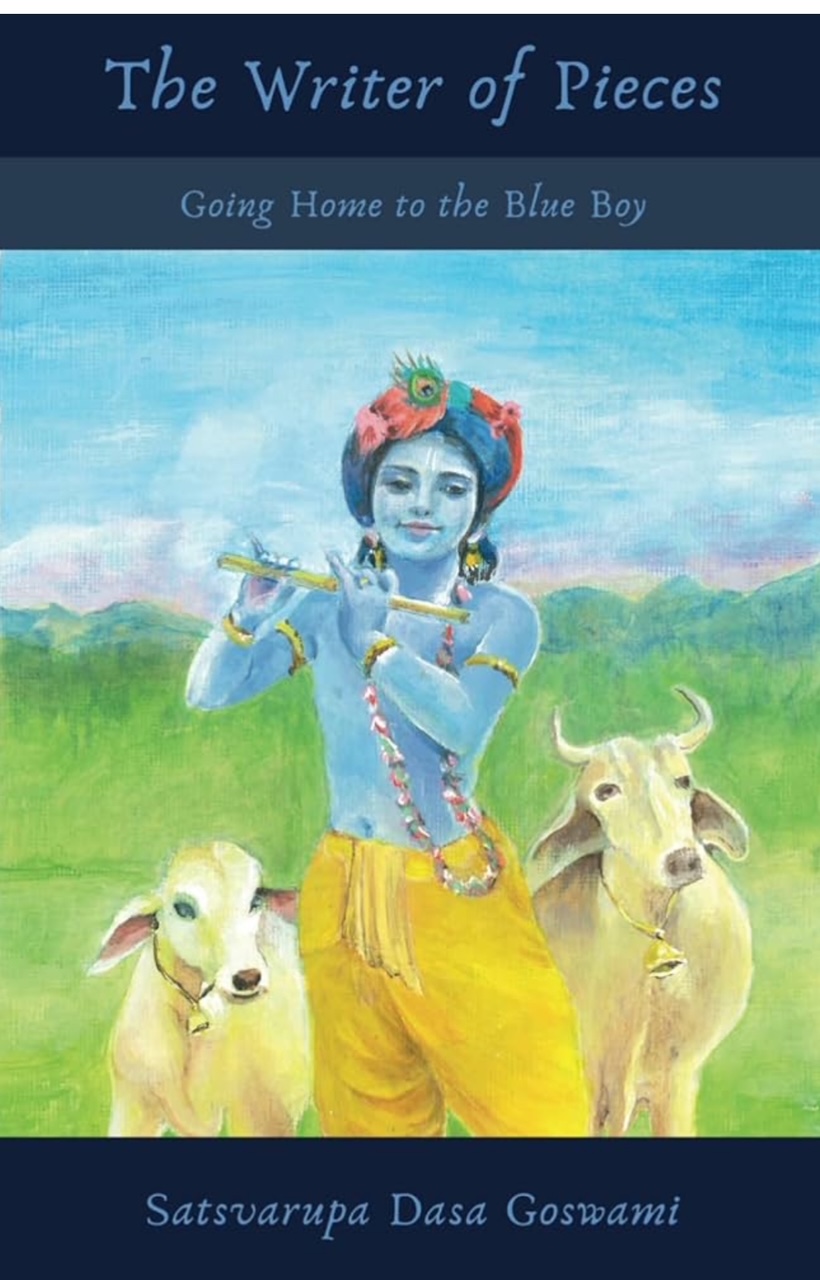
Don’t take my pieces away from me. I need them dearly. My pieces are my prayers to Kṛṣṇa. He wants me to have them, this is my way to love Him. Never take my pieces away.
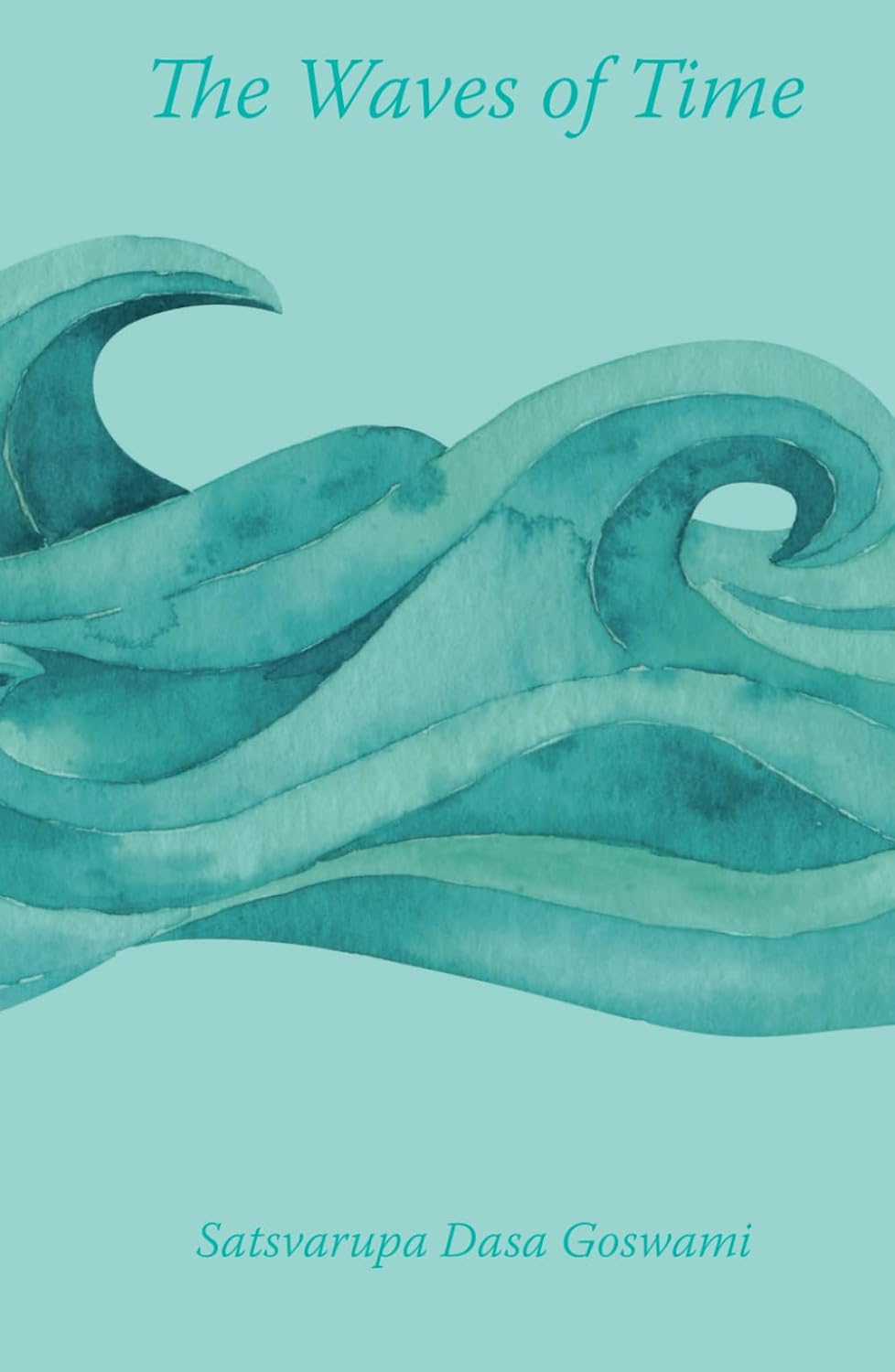
Many planks and sticks, unable to stay together, are carried away by the force of a river’s waves. Similarly, although we are intimately related with friends and family members, we are unable to stay together because of our varied past deeds and the waves of time.

To Śrīla Prabhupāda, who encouraged his devotees (including me) To write articles and books about Kṛṣṇa Consciousness.
I wrote him personally and asked if it was alright for his disciples to write books, Since he, our spiritual master, was already doing that. He wrote back and said that it was certainly alright For us to produce books.

I have a personal story to tell. It is a about a time (January–July 1974) I spent as a personal servant and secretary of my spiritual master, His Divine Grace A.C. Bhaktivedanta Swami Prabhupäda, founder-äcärya of the International Society for Krishna Consciousness. Although I have written extensively about Çréla Prabhupäda, I’ve hesitated to give this account, for fear it would expose me as a poor disciple. But now I’m going ahead, confident that the truth will purify both my readers and myself.

First published by The Gītā-nāgarī Press/GN Press in serialized form in the magazine Among Friends between 1996 and 2001, Best Use of a Bad Bargain is collected here for the first time in this new edition. This volume also contains essays written by Satsvarūpa dāsa Goswami for the occasional periodical, Hope This Meets You in Good Health, between 1994 and 2002, published by the ISKCON Health and Welfare Ministry.

This book has two purposes: to arouse our transcendental feelings of separation from a great personality, Śrīla Prabhupāda, and to encourage all sincere seekers of the Absolute Truth to go forward like an army under the banner of His Divine Grace A.C. Bhaktivedanta Swami Prabhupāda and the Kṛṣṇa consciousness movement.

A single volume collection of the Nimai novels.

Śrīla Prabhupāda was in the disciplic succession from the Brahmā-Mādhva-Gauḍīya sampradāya, the Vaiṣṇavas who advocate pure devotion to God and who understand Kṛṣṇa as the Supreme Personality of Godhead. He always described himself as simply a messenger who carried the paramparā teachings of his spiritual master and Lord Kṛṣṇa.

Dear Srila Prabhupada,
Please accept this or it’s worse than useless.
You have given me spiritual life
and so my time is yours.
You want me to be happy in Krishna consciousness
You want me to spread Krishna consciousness,

This collection of Satsvarūpa dāsa Goswami’s writings is comprised of essays that were originally published in Back to Godhead magazine between 1966 and 1978, and compiled in 1979 by Gita Nagari Press as the volume A Handbook for Kṛṣṇa Consciousness.

This second volume of Satsvarūpa dāsa Goswami’s Back to Godhead essays encompasses the last 11 years of his 20-year tenure as Editor-in-Chief of Back to Godhead magazine. The essays in this book consist mostly of SDG’s ‘Notes from the Editor’ column, which was typically featured towards the end of each issue starting in 1978 and running until Mahārāja retired from his duties as editor in 1989.

This collection of Satsvarupa dasa Goswami’s writings is comprised of essays that were originally published in Back to Godhead magazine between 1991 and 2002, picking up where Volume 2 leaves off. The volume is supplemented by essays about devotional service from issues of Satsvarupa dasa Goswami’s magazine, Among Friends, published in the 1990s.

“This is a different kind of book, written in my old age, observing Kṛṣṇa consciousness and assessing myself. I believe it fits under the category of ‘Literature in pursuance of the Vedic version.’ It is autobiography, from a Western-raised man, who has been transformed into a devotee of Kṛṣṇa by Śrīla Prabhupāda.”
 The Best I Could Do
The Best I Could DoI want to study this evolution of my art, my writing. I want to see what changed from the book In Search of the Grand Metaphor to the next book, The Last Days of the Year.
 a Hare Krishna Man
a Hare Krishna ManIt’s world enlightenment day
And devotees are giving out books
By milk of kindness, read one page
And your life can become perfect.
 Calling Out to Srila Prabhupada: Poems and Prayers
Calling Out to Srila Prabhupada: Poems and PrayersO Prabhupāda, whose purports are wonderfully clear, having been gathered from what was taught by the previous ācāryas and made all new; O Prabhupāda, who is always sober to expose the material illusion and blissful in knowledge of Kṛṣṇa, may we carefully read your Bhaktivedanta purports.

I use free-writing in my devotional service as part of my sādhana. It is a way for me to enter those realms of myself where only honesty matters; free-writing enables me to reach deeper levels of realization by my repeated attempt to “tell the truth quickly.” Free-writing takes me past polished prose. It takes me past literary effect. It takes me past the need to present something and allows me to just get down and say it. From the viewpoint of a writer, this dropping of all pretense is desirable.
 Geaglum Free Write
Geaglum Free WriteThis edition of Satsvarūpa dāsa Goswami’s 1996 timed book, Geaglum Free Write Diary, is published as part of a legacy project to restore Satsvarūpa Mahārāja’s writings to ‘in print’ status and make them globally available for current and future readers.